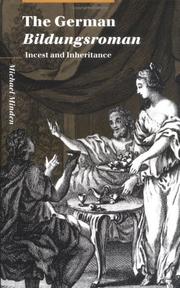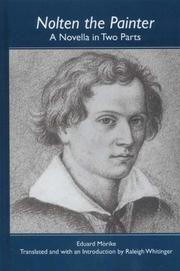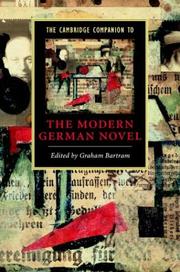| Listing 1 - 4 of 4 |
Sort by
|

ISBN: 0511006039 9780511006036 0521495733 Year: 1997 Publisher: Cambridge ; New York : Cambridge University Press,
Abstract | Keywords | Export | Availability | Bookmark
 Loading...
Loading...Choose an application
- Reference Manager
- EndNote
- RefWorks (Direct export to RefWorks)
"The Bildungsroman - the story of the development or formation of a young man - is the most famous German contribution to the European novel. Most studies of the Bildungsroman have concentrated on its underlying philosophy; Michael Minden addresses it as literature. He offers detailed readings of some of the best-known novels in the German language, from Goethe to Mann, including Wilhelm Meisters Lehrjahre, Agathon, Anton Reiser, Hyperion, Heinrich von Ofterdingen, Der grune Heinrich, Der Nachsommer and Der Zauberberg. Looking at the novels from the points of view of gender, subjectivity and ideology of the aesthetic, and taking account of late-twentieth-century literary theory, Minden uncovers aspects and motifs which subvert traditional ideas of the Bildungsroman and raise questions about the function and status of literature."--Jacket.
Bildungsromans. --- German fiction --- Bildungsromans, German --- Bildungsromans --- Germanic Literature --- Languages & Literatures --- Apprenticeship novels --- Bildungsroman --- Bildungsromane --- Coming of age --- Coming-of-age novels --- Entwicklungsromane --- Erziehungsromane --- Fiction --- German Bildungsromans --- History and criticism. --- History and criticism --- Goethe, Johann Wolfgang von,

ISBN: 1281741361 9786611741365 1571136665 1571133127 Year: 2005 Publisher: Rochester, N.Y. : Camden House,
Abstract | Keywords | Export | Availability | Bookmark
 Loading...
Loading...Choose an application
- Reference Manager
- EndNote
- RefWorks (Direct export to RefWorks)
When one thinks of German artist-novels and 'Bildungsromane,' works long available in translation come to mind-by Goethe, Novalis, Hoffmann, Stifter, Keller, or more recently by Mann, Kafka, Musil, or Grass. Yet Eduard Mörike's provocatively subtitled 'Maler Nolten: Novelle in zwei Teilen' (Nolten the Painter: A Novella in Two Parts, 1832) has remained neglected and misunderstood, and until now has never been translated into English, despite its obvious ties to other artist-novels and its striking modernity in playing with conventions of narrative authority and heroic identity. Witness the subtle irony of the opening sequence, in which the narrator is subverted by hints at his own clumsiness and intimations about the dire truths that lurk behind the protagonist Nolten's relationships to his male friends and to the seductive yet somehow frightening women in his life. Or the interplay between the narrator's attempts to make sense of Nolten's complex inner motivations in his loves and art and the ludicrously pompous pathos with which Nolten persists in speaking and thinking, as he concocts a heroic persona caught up in passion, intrigue, and tragedy. Fascinating too is the mysterious trail of the 'Grenzgänger,' or border-line characters, with their hints at the dimension of 'Gypsies, Tramps, and Thieves' that seems to threaten and at the same time to foster the complex unfolding of the realities of life and art that defy Nolten's all-too-artful 'mastery.' Raleigh Whitinger is professor in the Department of Germanic Languages at the University of Alberta.
Bildungsromans, German. --- German Bildungsromans --- German fiction --- Mörike, Eduard, --- Mërike, Ė., --- Molike, Aidehua, --- Möricke, Eduard, --- LITERARY CRITICISM / General. --- Bildungsromane. --- Eduard Mörike. --- German Artist-Novel. --- Gypsies. --- Heroic Identity. --- Narrative Authority. --- Raleigh Whitinger. --- Thieves. --- Tramps. --- Morike, Eduard,

ISBN: 0521482534 0521483921 051199978X 1139815482 9780521482530 9780521483926 9780511999789 Year: 2003 Volume: *86 Publisher: Cambridge Cambridge university press
Abstract | Keywords | Export | Availability | Bookmark
 Loading...
Loading...Choose an application
- Reference Manager
- EndNote
- RefWorks (Direct export to RefWorks)
The Cambridge Companion to the Modern German Novel, first published in 2004, provides a broad ranging introduction to the major trends in the development of the German novel from the 1890s to the present. Written by an international team of experts, it encompasses both modernist and realist traditions, and also includes a look back to the roots of the modern novel in the Bildungsroman of the late eighteenth and nineteenth centuries. The structure is broadly chronological, but thematically-focused chapters examine topics such as gender anxiety, images of the city, war, and women's writing; within each chapter, key works are selected for close attention. Unique in its combination of breadth of coverage and detailed analysis of individual works, and featuring a chronology and guides to further reading, this Companion will be indispensable to students and teachers.
Bildungsroman --- Roman éducatif --- Bildungsromans. --- Bildungsromans --- German fiction --- History and criticism. --- Roman allemand --- Histoire et critique --- 19th century --- History and criticism --- 20th century --- Languages & Literatures --- Germanic Literature --- Bildungsromans, German --- German Bildungsromans --- ROMAN ALLEMAND --- ROMAN D'EDUCATION --- 19E SIECLE --- HISTOIRE ET CRITIQUE --- 20E SIECLE
Book
ISBN: 1108787320 1108774466 1108477682 1108806872 Year: 2020 Publisher: Cambridge : Cambridge University Press,
Abstract | Keywords | Export | Availability | Bookmark
 Loading...
Loading...Choose an application
- Reference Manager
- EndNote
- RefWorks (Direct export to RefWorks)
Goethe's Willhelm Meister novels, widely held to be the most significant and influential in all of German literature, have traditionally been classed as Bildungsroman, or 'novels of formation'. In Goethe and the Myth of Bildungsroman, Frederick Amrine offers a unique reading of Wilhelm Meister's Lehrjahre and Wilhelm Meister's Wanderjahre, which posits the second novel as a sequel to the first. Deconstructing and jettisoning the notion of the Bildungsroman, the features of the novels which have historically proved problematic for critics, seeming to testify to the novels' disunity, become instead the articulation points of a subtle concord between thematic and formal elements. Reading the novels in light of the eminent criticism of Northrop Frye, this book productively shifts away from social commentary towards the archetypal and symbolic, showing Goethe not to be an exception within world literature; rather, that he participates deeply in its overarching structures.
Goethe, Johann Wolfgang von, --- Goethe, Johann Wolfgang --- Goethe --- Goethe, Johann Wolfgang von --- Von Goethe, Johann Wolfgang --- von Goethe, Johann Wolfgang --- Hete, Johann Vol'fhanh --- Gete, Iogann Vol'fgang --- ゲーテ --- Gete, Volʹfgang --- Ko-tê --- Gede --- Gete, Jogann --- Gette --- Gʹote, Ĭokhan Volʹfgang --- Jūtah, Yūhān Fūlfjānj --- Goethe, J. W. --- Jītī --- Gete, V. --- Koetʻe --- Goetʻe --- Getė, --- Gkaite --- Gitah, Y. Ṿ. --- Goethe, Jan Wolfgan, --- Gëte, Iogann Volʹfgang --- Göte --- Gyoete --- Goethe, W. v. --- Fon-Geteh, Ṿ. --- Geteh, Yohan Ṿolfgang Fon --- -Giteh, Yohan Ṿolfgang Fon --- -Gete, Johan Volfgang --- Hete, Ĭ. V. --- Kēōtʻē, Volfkank --- Katē --- Katē, Yōkān̲ Vulpkēṅk Vān̲ --- Гете, Иоганн Вольфганг --- Qöte, Y. V. --- Qöte, Yohan Volfqanq --- גטה --- גטה, יוהאן וולפגנג פון, --- גטה, י.ו --- גיתה --- גיתה, יוהאן וולפאנג פון --- גיתה, יוהאן וולפגנג פון, --- גיתה, יוהן וולפגאנג וון, --- גיתה, יוהן וולפגנג פון, --- גיתה, יוהן וולפגנג, --- געטהע --- געטהע, יאהאן וואלפגאנג --- געטהע, יאהאן וואלפגאנג פון, --- געטהע, יאהאן װאלפגאנג, --- געטהע, י. וו --- געטהע, י. וו. פאן --- געטהע, י. װ., --- געטהע, י.װ --- געטע, װ.פ --- גתה, וו --- גתה, יוהן וולפגאנג ון, --- גתה, יוהן וולפגנג --- י. וו. געטהע --- جوته --- گوته، يوهان ولفگانگ ون --- 歌德, --- Criticism and interpretation. --- Bildungsromans, German --- History and criticism. --- German Bildungsromans --- German fiction --- ゲエテ
| Listing 1 - 4 of 4 |
Sort by
|

 Search
Search Feedback
Feedback About UniCat
About UniCat  Help
Help News
News